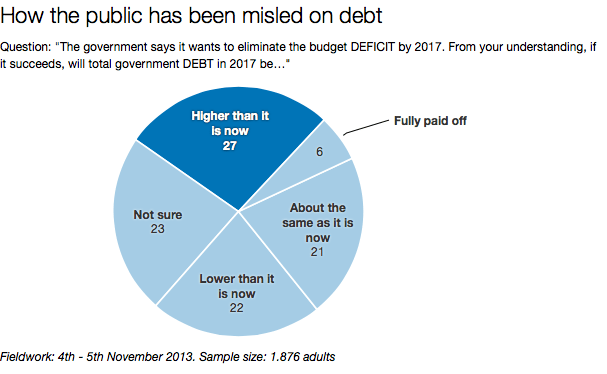The Guardian’s superb live blog was even better than usual this morning when it covered Twitter’s reaction to the Ed Miliband interview: eight tweets, of which five came from Spectator staff. That’s what I call balance: opinion from the full spectrum of opinion in 22 Old Queen St. We were challenging Miliband’s claim when he said the debt was “lower than what we inherited” – it was about £200bn higher. I can’t imagine these tweets went down too well with Guardian readers, because an update emerged later saying that the debt/GDP ratio fell. So was Ed speaking the truth after all?
I’m rather keen on this topic. We journalists do the public a great disservice if we just repeat jargon – especially jargon intended to mislead voters. So, for example, if George Osborne wrongly claims to have ‘halved the deficit’ in a broadcast interview, he needs to be picked up on that – otherwise the listener is successfully misled. I’m pleased to see the Tories abandoned this untrue claim within a week of getting hammered for it. If Labour had been similarly hammered in the mid-2000s, we might have avoided this mess.
Gordon Brown’s over-spending may now be seen, in retrospect, as a massive mistake. But it wasn’t described that way at the time (except to the EU, which formally censured him for running up such a debt). There was a political consensus behind his massive spending (thanks to Osborne) so it wasn’t an issue. This is a flaw in political journalism: too often, we restrict ourselves to reporting squabbles and don’t investigate stories on which there is consensus. As Nigel Lawson once remarked, a consensus means more need for journalistic scrutiny than ever, because bad ideas go unchallenged otherwise.
Brown’s greatest trick was to persuade people that the word ‘debt’ has more than one meaning. It doesn’t: debt is measured in pounds sterling. Ask any dictionary. A debt/GDP ratio is not debt, not ‘debt as’, it’s a ratio. Now, while it’s true that the handful of economists who study public finances may use ‘debt’ as shorthand for ‘debt/GDP ratio’ the public don’t: the word ‘debt’ has a very clear and very distinct meaning. Most of us are in debt, and our personal debt is either rising or falling. Who would say their personal debt is falling, just because their pay is rising? Yes, debt/salary is an important metric. But when your debt falls, it falls.
But by persuading journalists to accept the misleading verbal construction of “debt, as a share of GDP”, Labour was able to abbreviate this to ‘debt’ and then say that debt was going down, when it was actually going up. To his shame, Osborne tried to use the same trick to make out that he ‘halved’ the deficit.
And the word ‘deficit’, by the way, is a Westminster wonk word used by almost nobody outside SW1. Most voters would guess that ‘deficit’ means ‘government debt’. So if Osborne (or Brown) says ‘the deficit is falling!’ the average viewer hears ‘debt is falling’.
And this misleads a whole nation. A while ago, we at the Spectator asked YouGov to run some polling on this. It shows that only 27pc of the public realise that debt is rising. This is in line with several similar polls.

Failure to communicate what’s happening to UK national debt is a scandal, made all the worse when you remember that it’s the voters who will be repaying all of this debt. This is why journalists should always insist upon clear language, no matter how boring or nit-picking it seems.
Now and again, you’ll hear wonks saying ‘why the fuss? All economists know that debt/GDP is the only important question’ – which may well be true. But MPs who conflate ‘debt’ with ‘debt/GDP ratio’ are not taking to economists – they are talking to (and successfully misleading) voters. Under Ed Balls plans, for example, debt will not ‘fall’ as he claims. It will rise, but at a slower rate than the economy is growing. And if interrupting a politician to point this out slows the flow of an interview, so be it. It’s their duty to the listener.
Picking up George Osborne for saying ‘deficit halved’ or picking up Ed Miliband for saying “net debt will be falling” (another false claim he made this morning) is not hair-splitting. It’s not about economics. The question is about basic honesty – and how far journalists should insist upon it.
So please be patient with journalists when they make sure no MP, from any party, is allowed to use these little tricks. For a long time, politicians have been allowed to get away with misleading language to the extent that, now, only a minority of voters realise that debt is rising. I’ll sign off with the below image showing just how far that’s untrue.








Comments